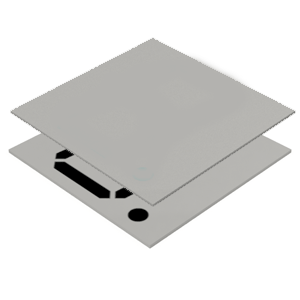MATERIALS APPLICATION RESEARCH
Repurposing thermochromic inks to indicate volume instead of temperature
As an exercise in Materials Research and Applications, I chose to study thermochromic inks, it's operating science and devise new applications.
Thermochromic Inks have been around in mainstream culture since the 1970's, appearing in one of that era's lasting cultural icons - Mood Rings, which supposedly used the wearer's Body Heat as a sign of his or her Emotional State.
The two common approaches are based on Liquid Crystals and Leuco Dyes. Liquid Crystals are used in precision applications, as their responses can be engineered to accurate temperatures, but their color range is limited by their principle of operation.
Operating Principle for Liquid Crystal based Thermochromism
Operating Principle for Leuco Dye based Thermochromism
Thermal Conduction is the spontaneous flow of Heat Energy from the Heat Source to the Heat Sink. The heat flows from the higher temperature down the temperature gradient to the lower temperature.
Display Dynamic Information
Dynamic QR codes for Print that transition when triggered with Electric Resistance Induced Heat.
Efficient Solar Cooking
Solar Cookers that prevent overcooking/indicate when food is ready without opening the Cooking Chamber, which dissipates all the heat and has to start reheating all over again when opened to check whether the food is prepared or not.
Super Thin Displays
By utilising the heat generated by Electric Resistance in Conductive Ink, a 2-Layer Super Thin Low-Resolution Display can be Generated.
By rubbing the canister on clothes, the friction creates enough heat to render the top coat of Thermochromic Ink transparent; when it reappears, the portion of the canister’s surface that touches the fluid inside cools faster and creates a clear indication of the fluid volume inside the canister.
Proof of concept tested with Black Thermochromic Ink that turns transparent at 45 Degree Celsius .
In the case of an opaque canister, the liquid inside the canister acts as a Heat Sink due to Thermal Conduction. By creating a temperature gradient, the Thermochromic Ink displays the level of liquid in the container.








